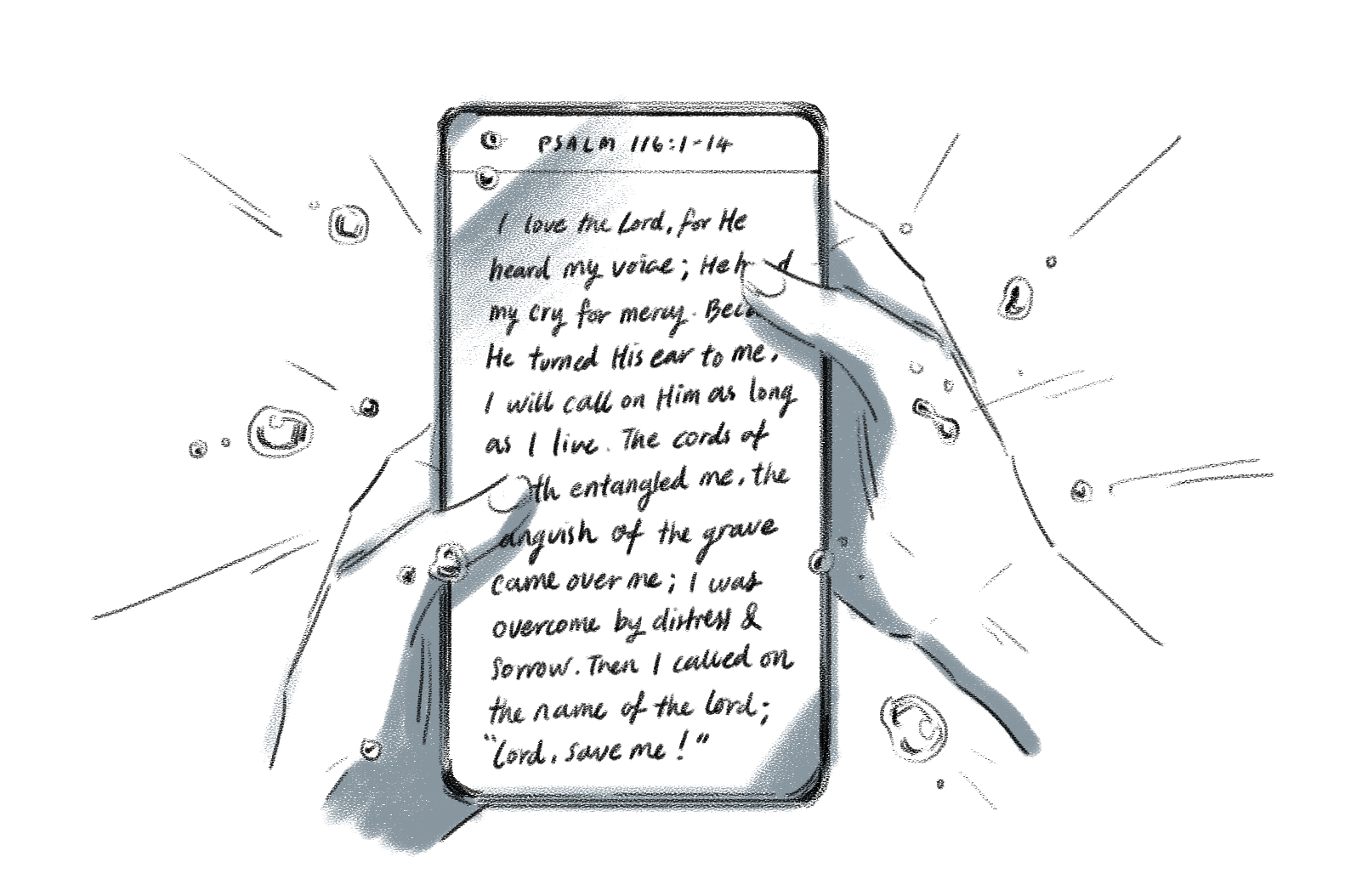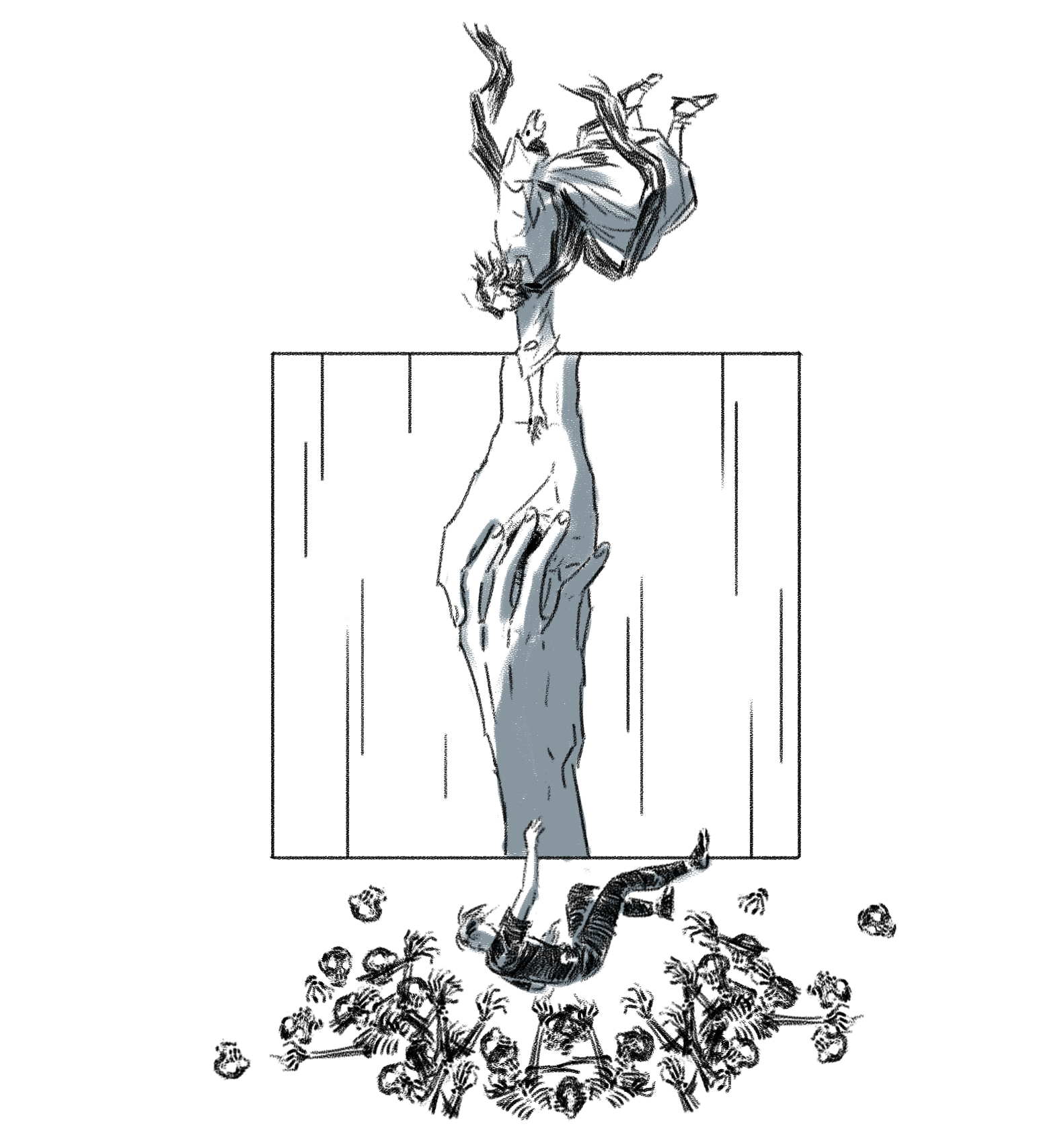I chose to use my actual name to show you that there is a real person behind this story, and you don’t have to be ashamed of what you’re struggling with.
Eight months after I started struggling with depression, anxiety and suicidal thoughts, things hadn’t really gone better even though there was some progress made along the way.
I was still very sensitive to triggers; I was still having episodes where I broke down emotionally, and I was still waking up shocked and with nightmares.
All this affected how I approached my church conference that everyone in church was getting excited and ready for – I realised that I was feeling quite indifferent about it.
A part of me felt like there was no point asking God about my mental health struggles anymore. I had asked for healing before. I had felt ministered to before. I had hope before.
Yet I had fallen back into the same cycle of struggling again and again. How is this time going to be any different?
I knew that I need to be patient with the process. I knew that it’s about a journey of waiting on God, but I was waiting in fear instead of waiting in faith.
I feared that if I were to hope and pray for a breakthrough or healing, I would be disappointed if it didn’t come through.
I was afraid to even ask, because I wasn’t sure if God would answer.
A new gratitude
Yet during one of the worship sessions at the conference, God ministered to me through His Word in Psalm 116:1-14.
It’s a long one, but I promise you that reading it will bless you:
I love the Lord, for he heard my voice;
he heard my cry for mercy.
Because he turned his ear to me,
I will call on him as long as I live.
The cords of death entangled me,
the anguish of the grave came over me;
I was overcome by distress and sorrow.
Then I called on the name of the Lord:
“Lord, save me!”
The Lord is gracious and righteous;
our God is full of compassion.
The Lord protects the unwary;
when I was brought low, he saved me.
Return to your rest, my soul,
for the Lord has been good to you.
For you, Lord, have delivered me from death,
my eyes from tears,
my feet from stumbling,
that I may walk before the Lord
in the land of the living.
I trusted in the Lord when I said,
“I am greatly afflicted”;
in my alarm I said,
“Everyone is a liar.”
What shall I return to the Lord
for all his goodness to me?
I will lift up the cup of salvation
and call on the name of the Lord.
I will fulfill my vows to the Lord
in the presence of all his people.
As I took out my phone and read the psalm, I broke down immediately. I got onto my knees and started crying uncontrollably.
Every line of the psalm resonated with me. In the past few months of struggling, it had always been God who heard my cry and came to my rescue.
Even in times when I was engulfed by my emotions, anxiety and thoughts of death, God had always reached out to me and protected me.

He had saved my life, again and again, both spiritually and physically.
I was overwhelmed by a sense of gratitude towards God. He had pursued me relentlessly. He had always met me with compassion and grace. He really does love me!
And so, I responded to God through the song Gratitude by Brandon Lake:
So I throw up my hands
And praise You again and again
‘Cause all that I have is a hallelujah
Hallelujah
And I know it’s not much
But I’ve nothing else fit for a King
Except for a heart singing hallelujah
Hallelujah
Even if I continue to deal with these struggles, even if all I have is a hallelujah, even if it’s nothing close to how much You’re worth… I will give You my all.
God, I no longer want to let these mental health struggles stand in the way of my intimacy with You.
Come and do Your work in me. I fully accept the season of refinement that You are bringing me through.
Would You restore my praise, and the joy of Your salvation?
How the dark cloud lifted
I remained crying on the floor for the rest of the worship.
When it was time for us to return to our seats for the teaching, a few guys from my cell group had to come over and help me to get up.
Yet as I opened my eyes, I somehow felt like the dark cloud that had been surrounding my head was gone.
I felt as if something that was pressing on my chest had been lifted, and I could breathe freely again.
The world just suddenly felt different.
I also realised that the noises in my mind had gone quiet. My thoughts were not racing anymore. I wasn’t on my toes anymore. I felt like my mind could be at rest again. I felt comfortable in my own skin again.
Was that it? Did God just heal me?

It was only a few days later when I met my counsellor that I managed to make sense of the encounter a little bit more.
Beyond what I experienced physically, my counsellor pointed out that God had done a work in my heart – He has led me to recognise the worth of my life.
This question of worth was something that I had long struggled with because of certain relational traumas and hurts in my life; I doubted if I was worthy of love, and if I was worthy of living.
But when I saw how God had saved me time and time again even when I wanted to give up on my life, I realised that my life is definitely worth something.
This worth isn’t about my work, my studies, my relationships or my circumstances in life. I have worth simply because God has created me, and He has called me His child.
I have worth simply because God has created me, and He has called me His child.
I experienced a breakthrough during my encounter with God because He restored my sense of worth.
He helped me to recognise that I am His child who is worthy of His love, and so my soul can find rest in His love again.
So… what now?
Truth be told, I’m still not certain if I have been completely healed from depression and anxiety.
I don’t know if there’ll be relapses, and I don’t know if these struggles will hit me again one day.
But what I am certain about is that God definitely did a work in my heart.
Whatever happens in the future will not negate what He has done.

As I look back at the past few months, I am surprised by how the journey has turned out to be. I never once imagined that I would struggle with my mental health.
But one thing I’ve learned from the past few months is that these struggles are not meant to be gone through alone.
Hence, if you are figuring out how to navigate through mental health struggles, here are five tips from a fellow believer.
1. Accept your journey
I used to feel very frustrated and hopeless whenever I had a panic attack, depressive episode or insomnia. I always got disappointed and just wanted to get over them.
But as I learned to accept this painful season as part of my journey, I began to be more patient with myself and give myself space to struggle.
It’s okay if I can’t sleep. Just read a book, or watch some lighthearted videos. It’s okay that I no longer enjoy the food I liked. Just put some food into my stomach so that I don’t starve myself.
It’s okay to not be okay. And it’s okay if you don’t recover tomorrow. Give yourself the grace to struggle. You are not weak or problematic simply because you’re still struggling.
Rest in the fact that God and the people who love us are more patient with us than we are with ourselves.
2. Surround yourself with community
“A friend loves at all times, and a brother is born for a time of adversity.” (Proverbs 17:17)
When I recall how my cell group members picked me up from the floor after worship, my heart feels warm. It was an image of how the church community has journeyed with me through these struggles.
In times when I was weak, they picked me up and allowed me to lean on their strength. They fought to love me and pursued me even when I wanted to give up on myself.
Find friends or leaders in church whom you can trust, open up to, and allow to journey with you.
While they may not always be there for you or be able to solve all your problems (this is not a realistic expectation) they are nevertheless here to love and support you.
I find comfort in sharing about my struggles with these friends. Sometimes I gain strength from simply eating and spending time with them. Sometimes I lean on their faith by asking them for a prayer.
As limited as they are as humans, they can be God’s blessings in our lives if we can view them with trust and gratitude. Don’t say no on their behalf!
3. Seek professional help
As important as good community is, professional help is irreplaceable.
In these few months, my counsellor has helped me to process many complicated emotions, past traumas, and self-esteem struggles – things that my leaders and friends might not be able or know how to do even if I share with them.
My counsellor has also taught me many tactics and mechanisms that can help me to cope with my symptoms from depression and anxiety.
There is no shame in seeking help. If you are dealing with any form of mental health struggles, it would be good to reach out to a counsellor or a psychiatrist.
You will realise that you are really not alone in your struggles, and people can really help if you allow them to.
4. Set healthy boundaries
As I dealt with my mental health struggles, there were also many things that I needed to learn to do and also not to do.
I learned to make eating a discipline even if I had no appetite. Sometimes I had to force myself to get out of the house as much as I felt like lying on my bed for the whole day.
I learned to make eating a discipline even if I had no appetite.
I also turned down certain social gatherings because I knew that they could potentially trigger my struggles. And I needed to avoid spending too much time aimlessly on social media because I might come across content that could stir up my emotions and cause me to spiral downwards.
As you identify your potential pitfalls and triggers with the help of your counsellor or other people who journey with you, you need to be disciplined to work on them.
Avoid putting yourself in situations which are unhelpful for your struggles, and be mindful of what habits you can build to help yourself!
5. Turn to God for grace
At the end of the day, God is still journeying with us even as we deal with mental health struggles. While we might feel like God is absent when the struggles get intense, He is actually closer than ever (Psalm 34:18).
“My grace is sufficient for you, for my power is made perfect in weakness.” (2 Corinthians 12:9a)
In these few months, I have come to experience that God’s grace is really sufficient. He really knows what I need and He really provides.
Sometimes it might be a timely word of encouragement. Sometimes it might be a timely meet-up with a friend. Sometimes it might even be a deeper revelation about my struggles.

As I look back at how God has journeyed with me, I am reminded of Elijah’s encounter with God in 1 Kings 19.
When Elijah ran into the wilderness, depressed and despairing – God gave him rest, provided food and drinks for him and even affirmed that his journey was too much for him (1 Kings 19:7).
And later in the chapter, God also appeared to Elijah and gave him new instructions.
God has never lost you. He is still taking care of you, and He is still leading you. He is still bringing you through a journey.
As much as you may feel lost, overwhelmed, or even hopeless as you struggle with mental health, I hope to encourage you with this:
God has never lost you. He is still taking care of you, and He is still leading you. He is still bringing you through a journey.
The journey may be long and it may not be easy. So, just take it one step at a time and know that God is taking every step with you.
He is with you. And He is for you.
- Which part of Dawson’s story spoke to you? Why is that?
- What might God be saying to you through this article?
- Practically speaking, how can you respond to what God is saying to you?
- Do you know someone who could use an encouraging word or helping hand this week? Be there for them.









